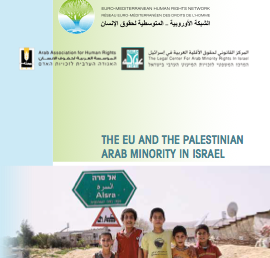Adalah Leads Tour of Diplomats from Latin America to Arab Bedouin villages in the Naqab
On 19 May 2014, Adalah and the Negev Coexistence Forum for Civil Equality (NCF) hosted a delegation of 10 diplomatic representatives from Latin American embassies in Israel on a tour of the Naqab (Negev). The tour sought to raise awareness about the challenges facing the Palestinian Bedouin community, particularly focusing on those living in communities at heightened threat of displacement under various Israeli government plans. The group also visited recently-recognized Bedouin villages, such as Umm-Batin and Abu Tlul, which continue to be denied access to basic infrastructure and regularly experience the demolition of new buildings. The diplomats also witnessed first-hand the challenges of forced urbanization on the Arab Bedouin community as they visited the government-planned Bedouin township of Hura, one of seven such urban townships.
During the tour, the delegation saw the construction site of "Intelligence City", a complex located in an area populated by more than 9,000 Bedouin citizens of Israel, which will serve as the center of Israeli military intelligence. The objection to the plan, filed by Adalah and Bimkom, was rejected on 12 December 2013.
In the unrecognized village of Umm el-Hieran, the delegates were welcomed by resident Salim Abu el-Qian, who shared the history of the town and his personal struggles with the government's policy of forced displacement. The Israeli government intends to demolish Umm el-Hieran and displace the residents in order to establish an exclusively Jewish town "Hiran" in its place. During the conversation, Salim emphasized the importance of sharing the stories of villages like Umm el-Hieran with the public and international decision-makers in order to ease the daily struggles of the villagers and achieve recognition of the unrecognized villages.
In the unrecognized village of Alsira, the delegation was welcomed by Khalil Alamour, a leader of the Alsira Local Committee and field researcher at Adalah's Naqab office, who gave the group a first-hand account of the village’s struggle. In spite of the state’s negligence, the villagers have promoted a spirit of innovation by equipping their homes with a self-installed village-wide Wi-Fi network, solar panels, and water filter system. In May 2014, the village of Alsira, represented by Adalah, achieved a major legal victory when the Be'er Sheva District Court rejected the state’s appeal and upheld the lower court’s decision to cancel demolition orders against the entire village.
Near Abu Tlul, the group also met with Fadi Msamra, the general manager of the Regional Council of the Unrecognized Villages (RCUV). In addition to his role at the RCUV, Fadi was a leader in the community-wide struggle against the government's Prawer Plan. The tour concluded in the unrecognized village of Khashem Zaneh, a village that existed before the establishment of the State of Israel in 1948. The village of 2,300 people is threatened by the planned extension of Route 6 (the major toll-road in Israel), which will pass through 6 unrecognized villages.
The participants expressed enthusiasm for the visit and commented that such tours were important in raising awareness of the issues facing the Bedouin community.
See Program of the Field Visit | See Photos of the Tour














